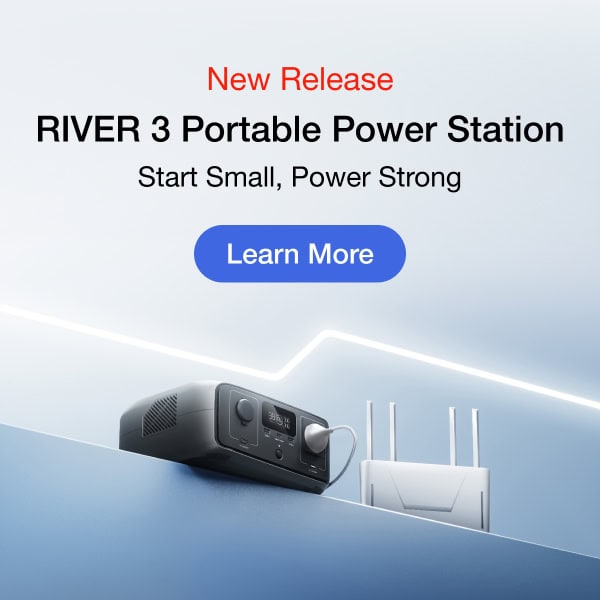We all rely on electricity to power the essentials in our lives, from necessities (such as refrigerators and heaters) to recreational devices (games consoles, laptops). Regardless of what they may be, we can’t live without them, which is why backup energy solutions are invaluable. They provide us with electricity whenever we need it.
However, not all power backup solutions operate the same. Two of the most prominent systems increasingly gaining popularity are portable power stations and solar-powered generators. But what’s the difference?
This guide will take you through the differences, pros, cons, and scenarios in which you’d want a portable power station vs a solar generator. By the end, you’ll be a backup power expert, empowered to make an informed purchase.
What Is a Portable Power Station?
A portable power station (PPS) is an energy-storing unit — the best friend to any intrepid explorer who likes to stay connected while travelling. In simple terms, it’s like an oversized rechargeable battery that stores power for later use. PPS units vary in capacity, usually measured in watt-hours. The higher the watt-hours of your PPS, the more it can power.
Portability varies from brand to brand, so if that’s a top priority for you, always read the specifications. Sometimes the same brand may even offer power stations of varying weights. For example, the DELTA Mini from EcoFlow weighs just under 24lbs (11kg), but the DELTA Max weighs in at 48lbs (22kg).
Generally speaking, the larger the device, the more powerful it is. Make sure to evaluate what you prioritise more, weight or power, before committing to a purchase.
How Does a Portable Power Station Work?
A portable power station is like a giant power bank, like the kind you might have to recharge your phone in a pinch. In addition to being larger, they can also power much more than just your smartphone, including larger home appliances such as your refrigerator.
You can supply the PPS with energy by attaching it to a wall outlet or car adaptor. The EcoFlow PPS solutions also have the option to attach a solar panel (sold separately). Depending on the brand, it can reach full charge in under two hours.
EcoFlow River 2 Portable Power Station

The EcoFlow River 2 is an example of a robust portable power station designed for use on the go. With a 256Wh capacity, it can charge 99% of consumer electronic devices. Three recharging options—wall outlet, car adaptor, or solar charging (panels sold separately or you can buy them together)—ensure backup power wherever you go.
At just 7.7 pounds, the River 2 is highly portable and ideal for taking on camping trips and similar excursions. And the LFP battery design means it produces zero greenhouse gas emissions, so you don’t need to worry about toxic fumes.
What Is a Solar Powered Generator?
Solar generators are similar to portable power stations, with one key difference: they generate energy. A PPS can only store energy, but a solar generator can create it using solar panels.
Solar generators also use rechargeable batteries to store and provide energy when needed. In addition, one of the biggest draws is its versatility, letting you recharge your batteries just about anywhere because of how solar works. As long as you have the sun, solar panels can convert that sunlight into renewable energy.
With EcoFlow, solar generators are just as portable as portable power stations. Products like the DELTA Mini + 220W solar panel use the same energy-storing unit but include a portable solar panel.
How Does a Solar Powered Generator Work?
When it comes to storing power, EcoFlow solar generators essentially function in the same way as portable power stations. The primary difference is that solar-powered generators include solar panels to recharge their batteries. Solar generators absorb sunlight via the panels, convert it into energy, and store the power for you to use on demand.
With EcoFlow solar generators, a built-in inverter converts the stored sunlight into alternating current (AC), which you can use to recharge your phone, laptop, refrigerator, and other home appliances.
The power capacity varies between devices, as does the wattage the attachable solar panels can collect.
EcoFlow DELTA Pro
The EcoFlow DELTA Pro with the 400W solar panel is a robust solar generator. It supports a capacity of 3.6kWh that you can expand up to 25kWh. It’s a powerful and durable machine that can run heavy-duty appliances, including refrigerators, televisions, and more.
The DELTA Pro includes a 400W panel to give you plug-and-play power off the grid. It’s the most reliable and powerful solution for camping, motorhome living, and home backup.
What Are the Differences Between a Portable Power Station and a Solar Powered Generator?
Portable power stations and solar-powered generators are more similar than they are different, but some criteria still set them apart.
Power Storage vs Power Generation
One of the most significant differences is that portable power stations store power, whereas solar generators harness new power by converting sunlight using solar panels. However, if you purchase solar panels to use with your PPS, you are essentially creating a solar-generator setup. Solar generators bundle the PPS and solar panels, allowing you to save money and get everything you need to generate power in one package.
Power Source
Portable power stations require an external energy supply to recharge their batteries. Usually, it requires a grid connection, but some also can connect to your vehicle using a car adaptor. You can attach solar panels, but you’ll need to purchase these separately.
Solar generators come ready-made. You can charge them using a wall outlet, car adaptor, or solar panels. For this reason, solar generators are far more versatile and allow you to go off-grid without worrying about how to source your power.
Portability
Due to the necessary addition of solar panels, generators tend to be a little heavier and larger than PPS systems. However, portability varies significantly.
A smaller model with solar panels will still be lighter than a more heavy-duty portable power station. Plus, with EcoFlow’s portable solar panels, you can fold up the panels for compact storage and transportation.
Should I Purchase a Portable Power Station or a Solar Powered Generator?
To close off our comparison, let’s talk about practicalities. Though both devices are handy for keeping you connected, there are specific scenarios where one has the edge over the other. If you’re looking for real-world examples, you’re in the right place. We have taken three scenarios and examined which product would better suit your needs.
Let’s get into it!
Camping
Getting out into the great outdoors is wonderful, and one of the appealing factors of this may be ‘disconnecting’ for a little while. However, you’ll probably still need at least a little electricity for practical items such as portable cookers, phones, and GPS devices.
Your first thought might be a portable power station, given that you can take them anywhere. But we give the edge to solar. Since you’ll be outdoors so much, using a generator that gets its power from the sun makes sense. With solar, you know you will have enough energy to keep you going without needing access to the grid.
Verdict: Solar-Powered Generator
Home Backup
Blackouts aren’t fun for anybody, but they can be a little more bearable with the help of a generator. One of the worst things about a total power outage is its effect on your refrigerated and frozen food and your ability to complete routines you may ordinarily take for granted. We rely significantly on electricity, so we need a reliable backup plan when it’s gone.
For this purpose, we recommend a portable power station. These compact devices often pack enough wattage to run larger appliances, including refrigerators and freezers, so you don’t need to worry about losing food. The DELTA Pro boasts a power capacity of 3600Wh, enough to run household appliances and small electronic devices, and it’s easy to keep charged for when a blackout hits.
Verdict: Portable Power Station
Outdoor Events
Planning the perfect outdoor event can be stressful. Whether it’s a wedding, a festival, or just an excuse to enjoy the summer, you want to ensure everything goes according to plan. This relies upon a power supply that won’t give up when you need it most.
With that in mind, we recommend a solar-powered generator. What better way could there be to power an outdoor event than by harnessing the power of the sun? You’re likely to be outside all day, and that’s the perfect condition for your solar generator.
The EcoFlow 160W solar panel is dust and water-resistant, too, so you don’t need to worry about any rainfall (or accidental drink spillages) affecting its performance.
Verdict: Solar-Powered Generator
Conclusion
So there you have it! Now you’re ready to go out into the wilderness (or plan the perfect event!) without worrying about how you will power it.
If you ever feel stuck, just remember that the critical difference between portable power stations and solar generators is the presence of a solar panel and the ability to generate power — not just store it.
Beyond that, they are very similar!
No matter which product you opt for in the EcoFlow range, we are sure you will be impressed by its capabilities.





